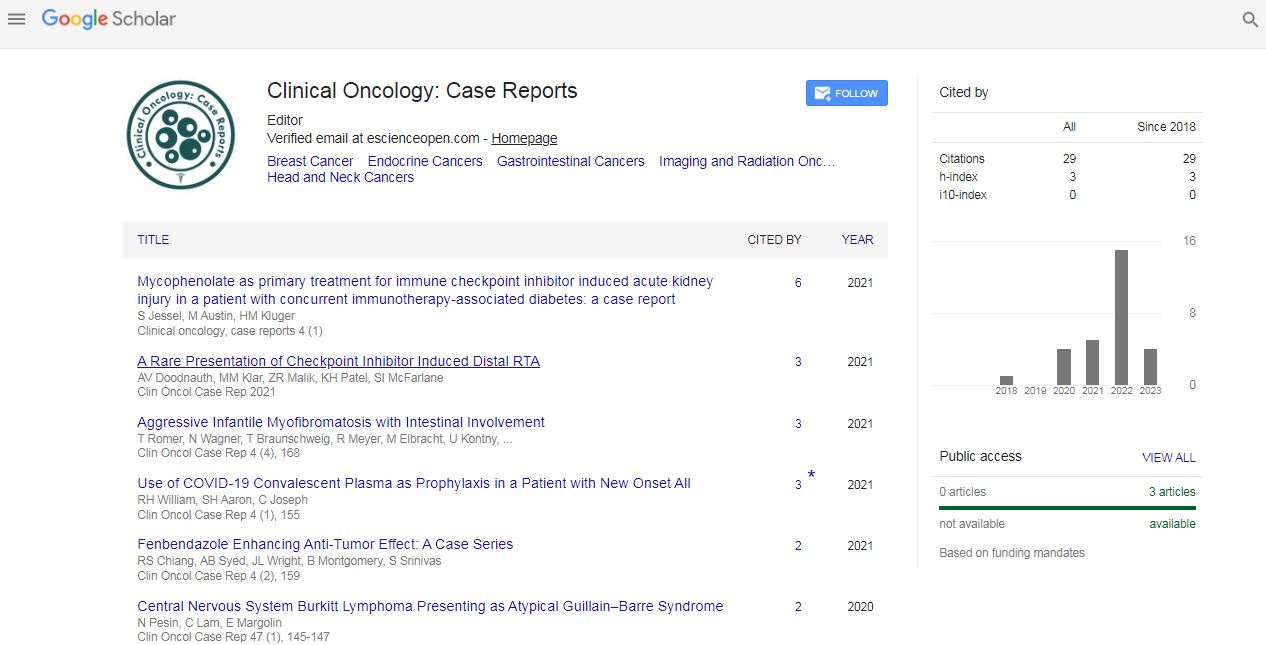Perspective, Cocr Vol: 7 Issue: 4
Advances in Precision Health Care: Revolutionizing the Medical Sector
Erica Smith*
The Affiliated University of Pennsylvania,USA
*Corresponding Author: Erica Smith,
The Affiliated University of Pennsylvania,USA
E-mail: ericaa163@yahoo.com
Received: : April 10, 2024; Manuscript No: COCR-24-132007
Editor Assigned: April 14, 2024; PreQC Id: COCR-24-132007 (PQ)
Reviewed: April 22, 2024; QC No: COCR-24-132007 (Q)
Revised: April 26, 2024; Manuscript No: COCR-24- 132007 (R)
Published: April 30, 2024; DOI: 10.4173/cocr.7(4).344
Citation: Smith E., (2024) UAdvances in Precision Health Care: Revolutionizing the Medical Sector Clin Oncol Case Rep 7:4
Abstract
Precision medicine is revolutionizing healthcare by customizing treatment plans for each patient according to their genetic composition, way of life, and surroundings. This article examines the development of precision medicine, as well as its essential elements, applications in several medical specialties, difficulties, and potential future paths. Precision medicine presents exciting opportunities to enhance patient outcomes and progress medical research, ranging from targeted treatments to genome sequencing. Precision medicine has the ability to completely transform the way that healthcare is delivered by utilizing state-of-the-art technologies and interdisciplinary teamwork to bring in an era of individualized and focused therapies.
Keywords: Biomarkers; Targeted therapies; Personalized medicine; Genomics; Clinical trials; Pharmacogenomics; Patient stratification; Data analytics; The healthcare revolution
Introduction
Precision medicine is a novel method that is becoming more and more well-known in the field of modern medicine. This paradigm change in healthcare delivery entails customizing medical procedures and treatments to each patient’s unique traits, including their genetic makeup and lifestyle preferences.
Evolution of Precision Medicine
The realm of genetics, where scientists started deciphering the intricacies of the human genome in the late 20th century, is where the idea of precision medicine first emerged. An important milestone was reached in 2003 when the Human Genome Project was completed, giving scientists a thorough blueprint of the human genetic code. Recent developments in genomic sequencing technology, including Next-Generation Sequencing (NGS), have made it possible to quickly and affordably analyze a person’s genetic composition.
Key Components of Precision Medicine
Precision medicine encompasses several key components, each playing a crucial role in its implementation
Genomics: The study of a person’s genes and how they interact is essential to precision medicine. The detection of genetic variants that may affect prognosis, treatment response, and disease susceptibility is made possible by genome sequencing technology.
Biomarkers: These quantifiable markers of biological processes or states can be used to track the effectiveness of treatment, identify illnesses, and forecast the likelihood of developing diseases.
Personalized therapy: Treatment plans tailored to an individual’s genetic profile, lifestyle factors, and environmental exposures. Personalized therapies may include targeted drugs, immunotherapies, or genebased interventions.
Data analytics: Genomics and clinical data are subjected to extensive dataset analysis, pattern recognition, and relevant insight extraction using sophisticated computational tools and algorithms.
Clinical trials: Thorough clinical research is necessary for precision medicine in order to assess the effectiveness and safety of new treatments in particular patient populations. Adaptive trial designs and studies driven by biomarkers are essential for the advancement of precision medicine programs.
Applications of Precision Medicine
Precision medicine is revolutionizing a number of medical specialties.
Oncology: Precision medicine makes it possible to identify biological targets and biomarkers that inform therapy selection and treatment response in the context of cancer treatment. The treatment of many cancers has been transformed by targeted medicines such immune checkpoint inhibitors and tyrosine kinase inhibitors.
Cardiology: In cardiovascular medicine, genetic testing and risk stratification tools help identify individuals at high risk of developing heart disease. Pharmacogenomics testing informs medication selection and dosing, reducing the risk of adverse drug reactions.
Neurology: For neurodegenerative diseases like Parkinson’s and Alzheimer’s, where genetic variables are important in the pathophysiology of the disease, precision medicine holds great potential. Diagnostic methods based on biomarkers support illness surveillance and early identification.
Infectious diseases: The management of infectious diseases is benefiting from the expanding application of precision medicine techniques, which are helping to develop vaccines and targeted therapies that are customized to each patient’s immune response. Public health strategies are informed by the tracking of infectious disease emergence and transmission by genomic monitoring.
Challenges and Future Directions
While precision medicine offers immense potential, several challenges must be addressed to realize its full impact
Data integration: Logistically and technically, integrating data from several sources such as genetic, clinical, and environmental information presents obstacles.
Ethical considerations: To protect patient autonomy and confidentiality, concerns about data privacy, permission, and fair access to genetic information need to be carefully considered.
Healthcare Equity: Uneven access to treatments and technologies in precision medicine raises questions about the fair provision of healthcare.
Regulatory Frameworks: Regulatory bodies must modify current frameworks to keep up with the quick speed of precision medicine innovation.
Precision medicine has a bright future ahead of it, despite these obstacles. Technological developments in bioinformatics, machine learning, and artificial intelligence have the potential to remove current obstacles and enable more accurate and customized healthcare solutions. Translating scientific discoveries into clinical practice and advancing precision medicine need concerted efforts from researchers, clinicians, legislators, and industry stakeholders.
Conclusion
Precision medicine, which offers individualized and focused methods for illness prevention, diagnosis, and treatment, is a paradigm change in the healthcare industry. Precision medicine promises to improve patient outcomes, lower healthcare costs, and advance medical research by combining the power of genomes, data analytics, and tailored therapeutics. As the discipline develops, interdisciplinary teams and cutting-edge technologies will be essential to achieving precision medicine’s full potential and revolutionizing healthcare delivery in the future. To sum up, precision medicine is more than just a catchphrase; it’s a revolutionary strategy with the power to completely change the healthcare industry.
 Spanish
Spanish  Chinese
Chinese  Russian
Russian  German
German  French
French  Japanese
Japanese  Portuguese
Portuguese  Hindi
Hindi 